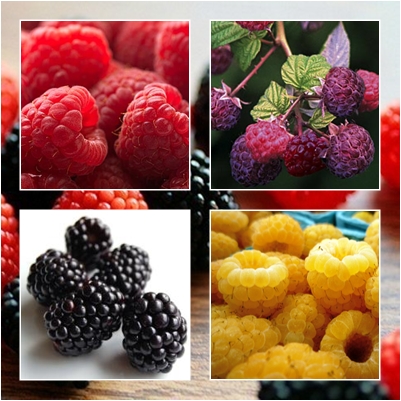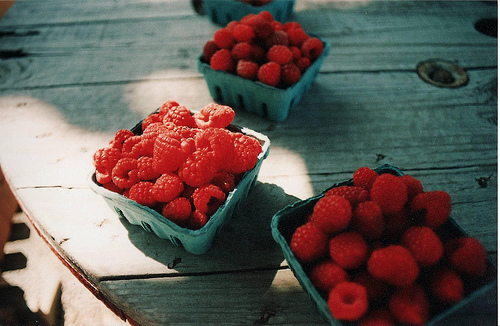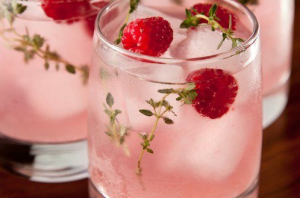Raspberry Juice
And its powerful antioxidant properties
Raspberry
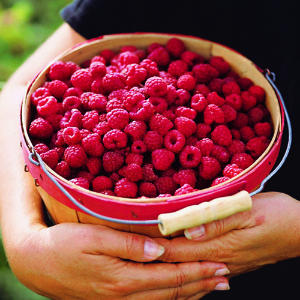 The tiny, red raspberry is also known as hindberry. You might think the raspberries are always red, but there are actually a lot of varieties with a lot of color hues. There are the dark-colored varieties such as black raspberries and the purple raspberries; and the albino-like varieties such as the pale-yellow raspberries or golden raspberries. There are diversities between these raspberry varieties; for instance, the black ones have a richer, bolder flavor than the typical red raspberry. A lot of people describe raspberry’s taste as the taste of summer – with their sweet and sour flavors they just melt in your mouth.
The tiny, red raspberry is also known as hindberry. You might think the raspberries are always red, but there are actually a lot of varieties with a lot of color hues. There are the dark-colored varieties such as black raspberries and the purple raspberries; and the albino-like varieties such as the pale-yellow raspberries or golden raspberries. There are diversities between these raspberry varieties; for instance, the black ones have a richer, bolder flavor than the typical red raspberry. A lot of people describe raspberry’s taste as the taste of summer – with their sweet and sour flavors they just melt in your mouth.
Raspberries are tiny fruit the size of grapes and blackberries. It is obviously a kind of berry which has a uniquely clump-like appearance, it’s like about a hundred clumps fused into one raspberry. They are fragile fruit which becomes tender once picked, so you might want to handle your freshly-picked raspberries with enough care and store them in a dry, safe place.
The first traces of raspberries (that is wild raspberries) which are even smaller and have more intense flavor, were found in eastern Asia such as China, Korea, Mongolia, Japan, Hong Kong, and Taiwan. Different varieties of raspberries also have different fruiting seasons – the typical red raspberry bears fruit every summer, while another variety, the red primocane blooms during autumn.
Raspberries are commercially cultivated and exported because they are a powerful antioxidant, similar to as blackberries. They come from the same family after all. Raspberries are usually consumed fresh, canned, dried, juiced, or frozen. They also make excellent tarts, pies, muffins, fruit salads, and can be turned into a fresh, revitalizing juice. The purple raspberry is in fact used to make Brandies wine which is loaded with antioxidants.
Raspberry Juice
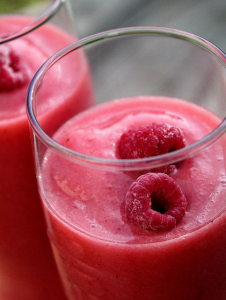 Picking raspberries in your backyard or in a huge orchard to make fresh raspberry juice is the best way to start. Making juice out of homegrown freshly picked fruits will give you the best results. Just make sure that they are ripe enough – look for the deep-colored ones which are plump and tender but not mushy. If you don’t have your own then buy them, but never pick or purchase overripe ones. Also make sure to refrigerate your raspberries if you’re planning to store them for several days.
Picking raspberries in your backyard or in a huge orchard to make fresh raspberry juice is the best way to start. Making juice out of homegrown freshly picked fruits will give you the best results. Just make sure that they are ripe enough – look for the deep-colored ones which are plump and tender but not mushy. If you don’t have your own then buy them, but never pick or purchase overripe ones. Also make sure to refrigerate your raspberries if you’re planning to store them for several days.
If your raspberries are ready, then you are ready to make some healthy raspberry juice.
Raspberry Juice Health Benefits
One thing is sure about raspberries: they are extremely healthy. Why? Raspberries are tiny yet powerfully flavorful and nutritious fruit. The list of nutrients that the contain is long as is the list of health benefits these nutrients give to you.
Excellent Source of Potent ANTIOXIDANTS
Here’s the A word again: Antioxidant. Well, there is a reason why antioxidants are the talk of the town. People nowadays are getting sick due to their lifestyle and habits and antioxidants are one of the ways to slow down or stop the negative effects of our lifestyles. Berries are actually number 1 on the antioxidant-rich food list; raspberries took the market by surprise as they rose up to the top 11 among all foods, including fruits and vegetables. They have a generous amount of 1220 ORAC (Oxygen Radical Absorbance Capacity) per 100 grams. Prunes which are number one and contain the highest antioxidant level have up to 5570 ORAC.
The phytonutrients in raspberries include potent antioxidants which prevents unwanted damage to cells because of oxidation by neutralizing free radicals that are the product of the oxidation. It contains an abundant amount of flavonoids which are classified as anthocyanins, a very effective antioxidant found in healthy fruits and vegetables which give raspberries their rich red color. Flavonoids also give raspberries their anti-microbial ability and can prevent growth of fungi. They also have the capability to kill and stop the growth of cancer cells in our bodies. They have 50% more effective antioxidants than strawberries, three times the antioxidant activity of a kiwi, and ten times the antioxidant activity of tomatoes! Now, that’s something!
Because of their ellegetannins content which is an antioxidant substance that can be found exclusively in raspberries, they also have anti-cancer ability. Their vitamin C content also contributes about 20% of the total antioxidant activity and focuses on strengthening the immune system and protecting us against harmful substances.
Excellent for Expecting Mothers
 The high potassium and pantothenic levels make it an ideal fruit for pregnant women’s diet. Its vitamins A, C, and E also contribute a lot to both the baby and mother.
The high potassium and pantothenic levels make it an ideal fruit for pregnant women’s diet. Its vitamins A, C, and E also contribute a lot to both the baby and mother.
Protects Against ARMD
The disease Age-Related Macular Degeneration, which dreadfully takes away 36 % of old adults’ vision, could be prevented by a constant consumption of raspberries, about 3 servings each day. I know that is a difficult task to do every day, but the results could bring you longevity.
 An Anti-Inflammatory
An Anti-Inflammatory
Studies showed that raspberries contain substances which can relieve inflammation, reduce the pain felt from arthritis, people with gout, asthma, and other inflammatory problems.
Lose Weight With Raspberries
A daily consumption of raspberries could actually get you the body you always dreamed of. The high levels of ketones in this fruit is used in Japan for losing weight in the form of pill supplements, but by eating fresh raspberries, you can loose weight naturally.
Makes your Skin Healthier and Fairer
The oil in raspberry seeds is now used in the cosmetics industry because it contains Omega-3 fatty acids, is rich in Vitamin E, and has a SPF of 25-50 which could protect your skin from the sun’s harmful rays.
Raspberry Nutritional Value
(per 123g of fresh raspberries)
64 Calories
Protein: 1.48 g
Lipid: 0.80 g
Carbohydrates: 14.69 g
Total Dietary Fiber: 8 g
Total Sugar: 5.44 g
Vitamin A: 41 IU
Vitamin C: 32.2 mg
Vitamin E: 1.07 mg
Vitamin K: 9.6 mcg
Thiamin: 0.039 mg
Riboflavin: 0.047 mg
Niacin: 0.74 mg
Pantothenic Acid: 0.41 mg
Calcium: 31 mg
Iron: 0.85 mg
Magnesium: 27 mg
Phosphorus: 36 mg
Potassium: 186 mg
Sodium: 1 mg
Zinc: 0.52 mg
Copper: 0.111 mg
Manganese: 0.824 mg
Selenium: 0.2 mcg
Vitamin B6: 0.07 mg
Folate: 26 mcg
Raspberry Juice Recipe for Summer
- 1 cup raspberry juice concentrate
- 2 cups of cold water
- 1 ½ tablespoons white sugar
- Ice cubes
- Mint sprigs
Directions:
- Mix the raspberry juice concentrate and cold water.
- Add the sugar and mix thoroughly.
- Pour the frothy mixture into a tall glass.
- Drop some ice cubes and garnish with mint sprigs just before serving.
- Enjoy!
More Articles On Raspberries And Raspberry Juice
Best Raspberries for Raspberry Juice And How to Choose Them
Making your own fruit juices at home is easy, and …Raspberry Juice Side Effects
Raspberry juice is safe to drink. There are no known …Raspberry Nutrition Facts
Raspberry Nutrition Facts Betaine 0,8 mg Calcium 25 mg Calories …Health Benefits Of Raspberry Juice
Raspberry juice is one of those juices that are not …
